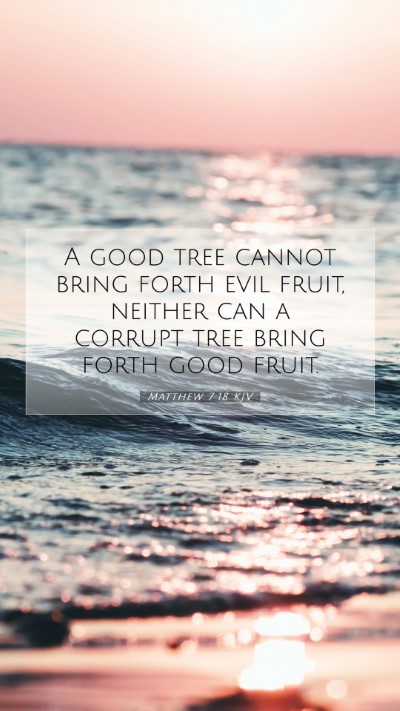Understanding Matthew 7:18: A Comprehensive Bible Verse Commentary
Bible Verse: Matthew 7:18 - "A good tree cannot bring forth evil fruit, neither can a corrupt tree bring forth good fruit."
Overview: This verse serves as a critical piece in Jesus' Sermon on the Mount, emphasizing the principle that the nature of a person's character will manifest in their actions. By examining this passage, we gain valuable insights into the broader themes of discernment, the character of believers, and the manifestation of fruit in our lives.
Meaning of Matthew 7:18
This verse illustrates a fundamental truth about moral and spiritual integrity. Relying on the teachings of public domain commentaries such as Matthew Henry, Albert Barnes, and Adam Clarke, we can distill the essence of this verse into several key points:
-
Nature Determines Fruit: As Matthew Henry notes, the metaphor of trees here signifies that a person's actions (fruit) reflect their inner character (tree). A "good tree" symbolizes a righteous and godly life, while a "corrupt tree" reflects moral decay and sin. Understanding Scripture hinges on recognizing that good actions stem from a good heart.
-
The Importance of Discernment: Albert Barnes emphasizes the discernment needed to evaluate the teaching and actions of others. Just as a tree's quality can be judged by its fruit, so can individuals and their teachings be assessed based on their outcomes and consequences. Such discernment is essential for Bible study insights.
-
Consistency of Character: Adam Clarke discusses the consistency between one's beliefs and actions. A true follower of Christ (the good tree) produces good fruits—such as love, kindness, and righteousness—illustrating the importance of aligning actions with faith for the application in daily life.
-
Spiritual Accountability: This verse also reflects the theme of accountability within the Christian faith. Those who profess to be believers must ensure their lives produce good fruit. Matthew Henry mentions that failure to demonstrate good behavior might indicate a need for deeper reflection on one's spiritual state.
Connecting Matthew 7:18 with Other Scriptures
This verse relates to several other biblical passages that reinforce its meaning:
- Luke 6:43-45: Similar imagery is used to illustrate the relationship between the heart and one's actions.
- Galatians 5:22-23: The fruits of the Spirit demonstrate the behaviors expected from a good tree.
- James 3:12: A commitment to integrity is reflected in the consistency of one's words and behaviors.
Application for Bible Study
Applying the insights from Matthew 7:18 in Bible study groups can invigorate discussions on how to live authentically:
- Examine Your Fruits: Encourage participants to reflect on the fruits they are producing in their lives. Are they embodying the characteristics of a good tree?
- Promote Accountability: Foster a community that holds one another accountable to live in ways that reflect their faith.
- Teach Discernment: Discuss the importance of evaluating teachings and lifestyles in light of Scripture, helping members to recognize good and bad fruit in their own experiences.
Concluding Thoughts
Matthew 7:18 serves as a poignant reminder of the connection between who we are at our core and what we produce in our lives. Engaging with this verse allows for a deeper Bible verse understanding, encouraging believers to examine their hearts and the fruits of their actions.
In-depth analysis, historical context, and nuances found within this scripture not only enhance our Bible verse commentary but also equip us with essential tools for spiritual growth and communal accountability.


